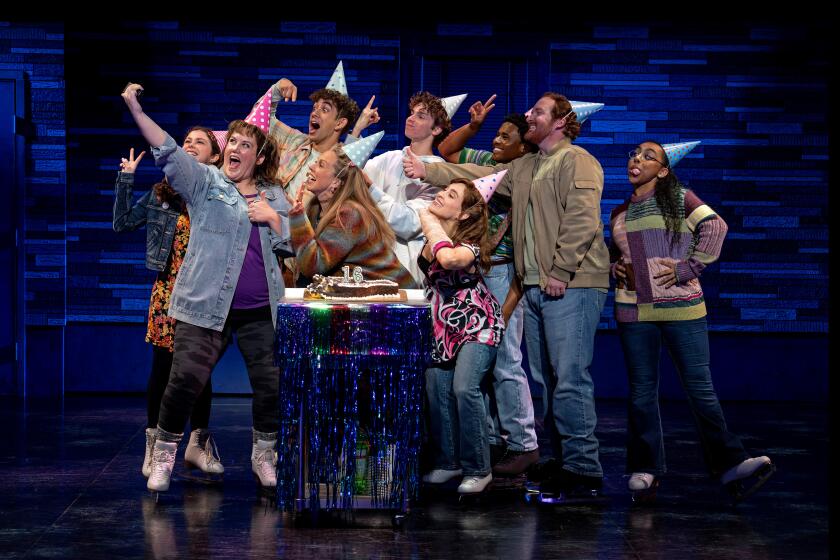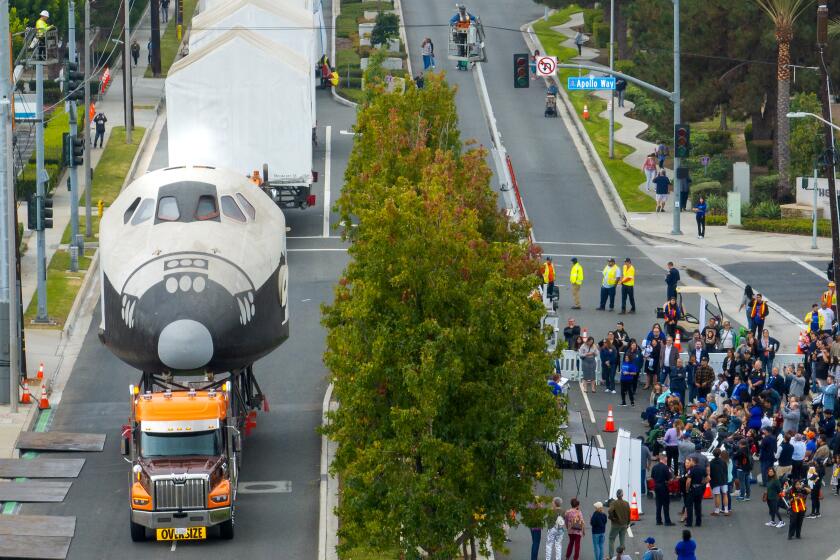L.A. Festival to Open Sans ‘Klinghoffer’ : Arts: Organizers say loss of Music Center Opera ‘pivotal’ work leaves a large gap. But opera group’s artistic director says it was never part of festival.
The Music Center Opera production of “The Death of Klinghoffer” has been postponed for a second time, causing a void in programming for the 1993 Los Angeles Festival. Peter Sellars, who conceived and directed the opera and is artistic director of the festival, said “Klinghoffer” was to be “a pivotal” work in this year’s event.
Sellars disclosed Monday night that Peter Hemmings, artistic director of Music Center Opera, informed him “by fax” in December that “Klinghoffer” would not be presented.
“I am not very happy,” Sellars said. “It’s a very important work that Los Angeles should see. Obviously I would very much like to be doing my own productions here. That came as a real blow.”
The opera was initially to have been presented at the Dorothy Chandler Pavilion last fall as part of the current season. Citing budget constraints, Music Center Opera postponed the work until the 1993-94 season. Sellars had hoped to incorporate the opera--about a 69-year-old Jewish-American who was shot and thrown overboard by Palestinian terrorists on a cruise ship in 1985--into this year’s festival, whose geographic focus includes the Middle East.
Declining to confirm the postponement, a clearly angered Hemmings disputed Sellars’ claims.
“What’s our ‘Klinghoffer’ got to do with the L.A. Festival, will you please answer (that)? . . . I’m sorry, there’s absolutely no arrangement between us and the L.A. Festival that ‘Klinghoffer’ would be part of the festival.”
Hemmings added that he will hold a press conference on Feb. 2 and will discuss “our repertoire in general, a number of things to do with the repertoire, the economic situation and artistic matters. That is when I will talk about ‘Klinghoffer,’ among other things. . . . ‘The Death of Klinghoffer’ was never part of the L.A. Festival.”
Sellars said he and Hemmings have had no conversation since that faxed message. “We spoke a great deal the first time it was canceled. There (is now) little more to say.”
Asked if money was a factor, Sellars indicated it could not be finances because of the “relatively small cast,” with the key players singing more than one role, and because much of the cost has already been paid for through a “seven-way co-production deal,” which included the Music Center Opera.
“Klinghoffer” was composed by John Adams with text by Alice Goodman, along with Sellars, the same team that created “Nixon in China.” After its world premiere in Brussels in March, 1991, “Klinghoffer” was presented in Lyons and Vienna. In the fall of 1991, it had its American premiere at the Brooklyn Academy of Music and was performed in San Francisco last November. It is scheduled for London in 1994.
Meanwhile, with seven months to go before the 1993 festival, officials are slowly parceling out information about this year’s programming.
“Home, Place and Memory” is the theme of the fourth major city-wide festival, featuring artists and groups representing “African, African-American, Middle Eastern and Middle-Eastern American peoples in Los Angeles, the Americas and throughout the world.”
This year’s festival will run from late August until the end of October--with a break for the Jewish High Holy Days in mid-September. “We want to be sensitive to the sacred traditions” of the peoples represented, said Allison Sampson, executive director of the festival.
Late last week, festival officials announced the first group confirmed to participate in the $5-million event, Sweet Honey in the Rock, a women’s a cappella ensemble whose music ranges from gospel and blues to songs from Africa and the Caribbean. Its lead singer and artistic director is Bernice Johnson Reagon, a curator at the Smithsonian Institution in Washington.
This trickling out of announcements is typical of L.A. Festivals, whose roots go back to the blockbuster Olympic Arts Festival in the summer of 1984, followed by the smaller-scaled festivals of 1987 and 1990. From a high of nearly $12 million in 1984, the festivals that followed downsized substantially: $5.9 million in 1987; $5.6 million in 1990.
Despite the shortage of details, Sellars insisted this festival will happen, but was unwilling to reveal any further commitments. “We’re not announcing anything until the whole program is done; everything has to balance with everything else. Take one piece out and the whole mosaic falls.”
Sellars said a festival brochure announcing the full roster of artists and groups would be published in May.
“This is the only (performance) we can talk about,” said Sampson, referring to Sweet Honey in the Rock. “A lot of our major programming is done in a sensitive way. We have a major grant for music and theater in the Middle East, which is still being curated and contracted. The street theater is now being funded.”
In budget-conscious times, Sweet Honey comes aboard with its own corporate sponsor--Transamerica Life Companies, whose $50,000 gift will sponsor two public performances by the group, as well as other performances in schools, churches and adult master classes. Its venue and program have not yet been announced.
The National Endowment for the Arts last year awarded $35,000 to the festival to support the commissioning and premiere of a new collaborative work by Sweet Honey, the Dayton (Ohio) Contemporary Dance Co. and choreographer Diane McIntyre.
About half the $5-million festival budget has been raised through donations and pledges, Sampson noted. The festival staff at present is 12, including Sellars and Sampson. There are also eight consultants.
Major donors include the City Redevelopment Agency, $500,000; the Los Angeles Cultural Affairs Department, which has already allocated $250,000 and is scheduled to give another $250,000 in the new fiscal year next summer; Evergreen International, a Los Angeles shipping company, $300,000; Occidental Petroleum, $250,000 for general support; the Lila Wallace-Readers Digest Fund Inc., $250,000 (for music and theater in the Middle East); Irvine Foundation, $200,000; the Ford Foundation (for the curatorial process), $125,000; the Audrey Skirball-Kenis Theatre (for political street theater), $125,000, and AT&T;, $100,000.
To avoid a shortfall, Sampson noted, money from ticket sales is not being included as revenue. A $600,000 debt from the 1990 festival was finally retired last summer, she said, about the same amount it earned on its essentially low-priced tickets.
Meanwhile for 1993, festival officials are projecting that 70% of its tickets will be free.
More to Read
The biggest entertainment stories
Get our big stories about Hollywood, film, television, music, arts, culture and more right in your inbox as soon as they publish.
You may occasionally receive promotional content from the Los Angeles Times.










